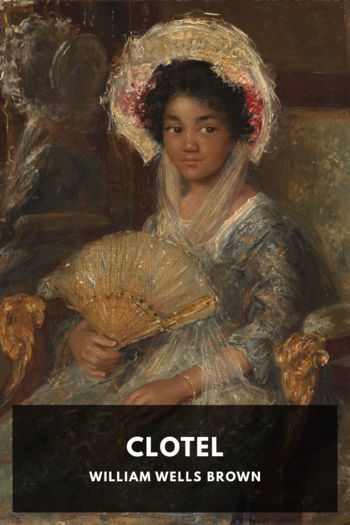Clotel, William Wells Brown [i like reading books .txt] 📗

- Author: William Wells Brown
Book online «Clotel, William Wells Brown [i like reading books .txt] 📗». Author William Wells Brown
Among those on whom Horatio’s political success most depended was a very popular and wealthy man, who had an only daughter. His visits to the house were at first purely of a political nature; but the young lady was pleasing, and he fancied he discovered in her a sort of timid preference for himself. This excited his vanity, and awakened thoughts of the great worldly advantages connected with a union. Reminiscences of his first love kept these vague ideas in check for several months; for with it was associated the idea of restraint. Moreover, Gertrude, though inferior in beauty, was yet a pretty contrast to her rival. Her light hair fell in silken ringlets down her shoulders, her blue eyes were gentle though inexpressive, and her healthy cheeks were like opening rosebuds. He had already become accustomed to the dangerous experiment of resisting his own inward convictions; and this new impulse to ambition, combined with the strong temptation of variety in love, met the ardent young man weakened in moral principle, and unfettered by laws of the land. The change wrought upon him was soon noticed by Clotel.
V The Slave MarketWhat! mothers from their children riven!
What! God’s own image bought and sold!
Americans to market driven,
And barter’d as the brute for gold.
Not far from Canal-street, in the city of New Orleans, stands a large two story flat building surrounded by a stone wall twelve feet high, the top of which is covered with bits of glass, and so constructed as to prevent even the possibility of anyone’s passing over it without sustaining great injury. Many of the rooms resemble cells in a prison. In a small room near the “office” are to be seen any number of iron collars, hobbles, handcuffs, thumbscrews, cowhides, whips, chains, gags, and yokes. A back yard enclosed by a high wall looks something like the playground attached to one of our large New England schools, and in which are rows of benches and swings. Attached to the back premises is a good-sized kitchen, where two old Negresses are at work, stewing, boiling, and baking, and occasionally wiping the sweat from their furrowed and swarthy brows.
The slave-trader Walker, on his arrival in New Orleans, took up his quarters at this slave pen with his gang of human cattle: and the morning after, at ten o’clock, they were exhibited for sale. There, first of all, was the beautiful Althesa, whose pale countenance and dejected look told how many sad hours she had passed since parting with her mother at Natchez. There was a poor woman who had been separated from her husband and five children. Another woman, whose looks and manner were expressive of deep anguish, sat by her side. There, too, was “Uncle Geemes,” with his whiskers off, his face shaved clean, and the grey hair plucked out, and ready to be sold for ten years younger than he was. Toby was also there, with his face shaved and greased, ready for inspection. The examination commenced, and was carried on in a manner calculated to shock the feelings of anyone not devoid of the milk of human kindness. “What are you wiping your eyes for?” inquired a fat, red-faced man, with a white hat set on one side of his head and a cigar in his mouth, of a woman who sat on one of the stools.
“I s’pose I have been crying.”
“Why do you cry?”
“Because I have left my man behind.”
“Oh, if I buy you I will furnish you with a better man than you left. I have lots of young bucks on my farm.”
“I don’t want, and will never have, any other man,” replied the woman.
“What’s your name?” asked a man in a straw hat of a tall negro man, who stood with his arms folded across his breast, and leaning against the wall.
“My name is Aaron, sir.”
“How old are you?”
“Twenty-five.”
“Where were you raised?”
“In old Virginny, sir.”
“How many men have owned you?”
“Four.”
“Do you enjoy good health?”
“Yes, sir.”
“How long did you live with your first owner?”
“Twenty years.”
“Did you ever run away?”
“No, sir.”
“Did you ever strike your master?”
“No, sir.”
“Were you ever whipped much?”
“No, sir, I s’pose I did not deserve it.”
“How long did you live with your second master?”
“Ten years, sir.”
“Have you a good appetite?”
“Yes, sir.”
“Can you eat your allowance?”
“Yes, sir, when I can get it.”
“What were you employed at in Virginia?”
“I worked in de terbacar feel.”
“In the tobacco





Comments (0)